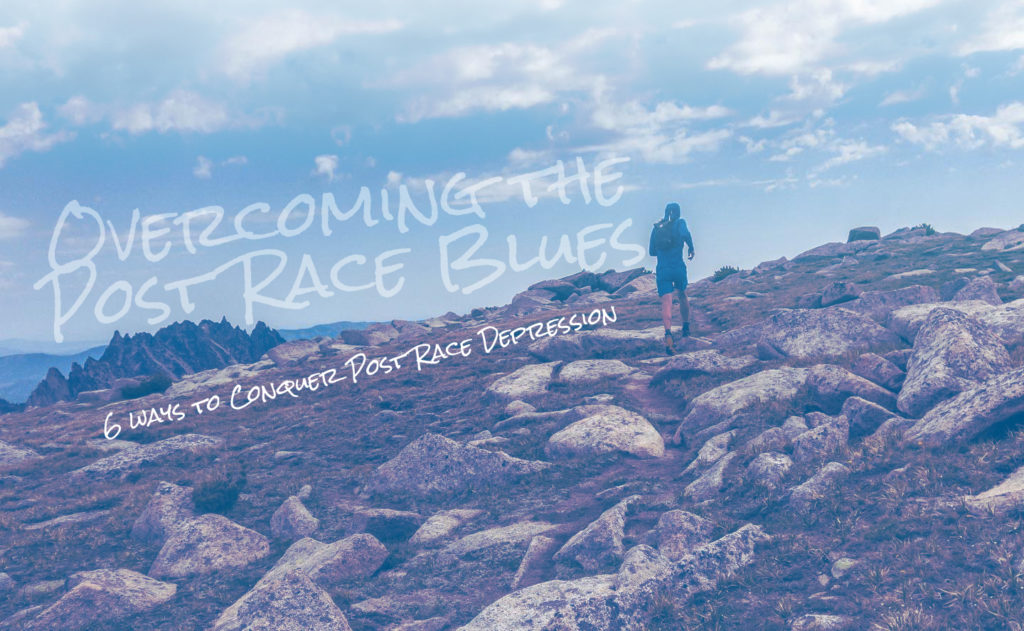
If you’re reading this, it’s likely that you, like me, have been there. You’ve experienced the post-race blues or post-race depression. If you enjoy signing up for a race, spending months training for it, and then competing in the said race, you’ve probably experienced some form of post-race blues. It’s not as uncommon as you may think at first. Like any form of depression, it’s easy to think you’re all alone, that you are the only one experiencing this, but the reality is, many many others have gone through something similar. I’m here to tell you that not only are you not alone, but there are some things you can do to counter the effects of the post-race blues.
What are the Post-Race Blues, and Why do we get the Post-Race Blues?
Before we look at reasonable solutions for post-race blues, let’s take a quick look at what’s happening to you and why it is happening.
When we sign up for an event, many of us will dedicate many many hours of our time to the endeavor, when that endeavor is over, it can often leave you feeling like something is missing. What’s happening? Why is this happening? Well, in part, you’re participation in the event is likely to create some sense of euphoria; the race itself is the climax of all your training. It’s the moment that you’ve longed for, it’s the central thought, and motivation for everything you’ve done for hours, days, and months at a time. When it’s over, it’s quite reasonable to feel lost, hopeless, and as to though everything important to you has concluded. It doesn’t matter if you win or lose, finish or don’t finish, what matters is you’ve just dedicated a significant part of your life to something, and now that the milestone has passed, you’re left to ponder, “now what?”
When we get these massive doses of adrenaline and dopamine, and they eventually wear off, it’s easy to find yourself completely and utterly stuck.
It sucks.
You hate it.
I hate it.
We all hate it.
There are a few reasons we might end up with the post-race blues; one reason involves situational depression. In these cases, the post-race blues is the reaction to an outside stimulus like an inferior race or injury. The “arrival fallacy,” a term coined by positive psychologist Tal Ben-Shahar in his book Happier, which describes the sentiment that reaching a long-term goal reduces happiness levels since the “atmosphere of growth” was what mattered most all along, is another possible cause of post-race blues. A combination of psychological principles may be the cause; it could be the result of a type of post-achievement let-down in which achieving a specific goal-moment leads to the loss of purpose which can manifest similarly to other depressive episodes. Perhaps it’s an evolutionary thing; one would not want to grow complacent after killing the gazelle because the panther may be lurking nearby. Or is it biological? We know that hard events release the stress hormone cortisol, which affects homeostasis in the endocrine system. Maybe it’s genetic, lifelong history of depression, or perhaps it’s a hormonal imbalance from a lack of endorphins, or it’s because we live in a complex world and challenging times. Maybe it’s a lot of things that cause you to have the post-race blues.
The truth is, it’s hard for me to tell you what causes your post-race blues because I’m not a doctor.
For more detailed answers, please seek out a mental health professional. Learning more about yourself is a good thing and very admirable. If you’re looking to get over some small post-race low, know that this is not something you should beat yourself up over. Your emotions are genuine, whether they are related to the post-race blues or anything else for that matter. Having the post-race blues does not make you a worse athlete or a worse person. There is nothing wrong with you because you feel your emotions, no matter what they are. You are enough, unconditionally, and I love you.
So, what’s one to do?

How to Overcome the Post Race Blues (Depression):
Sign up for another race – Many have found solace by signing up for multiple events at a time or by signing up for another event after their current endeavor. The act of having more races to train for keeps you focused on the next goal when the current one is complete. It’s a great tactic but can easily be derailed should you start competing in too many events back to back to back. Be cautious; this method doesn’t cure post-race blues; it just delays it, over and over and over until you stop signing up for more. I don’t recommend this option, but if you’re looking for a quick fix, this might get you where you need to be until you develop better coping mechanisms.
Talk about it – now it may be difficult to talk to someone like your best friend, your mother, or even your significant other if they themselves have never experienced the post-race blues. If you’re going to talk to someone, I encourage you to find something someone who has been in your shoes and understands the feeling and emotion you’re experiencing.
Find a therapist – while some may think it a bit extreme, it just might be the best way for you to develop the coping mechanisms you need to overcome the post-race blues. Find a therapist, someone you trust, and work with them on how to overcome the depression that often is associated with your desire to push your limits. Remember, it’s not only useful to push our limits physically, but mentally too, and a great place to cultivate that progression is in tandem with your therapist. I’ve been doing this, and it’s helped me more and more. After each event, I found myself less depressed because of the techniques my therapist and I have worked on together. Everyone may require different treatments, so it’s best to discuss what will work best for you with your therapist.
Let your body recover – letting your body heal and recover can go a long way, sometimes you’ll need a day or two, other times depending how much of an effort you made, how well you trained, how far you went, you may find you need a few days to recover. That’s okay. It’s best to let our bodies recover than go back to it too soon. This doesn’t give you free rein to sit on the couch for a week and eat Ben & Jerry’s every single day. Get up and walk, perform active recovery, stretch, roll, do yoga, stay mobile. Recovery is necessary; make sure you’re not just withering away. That’s not recovery.
Place the process on a pedestal – Results of any competition, event, or race are merely a brief moment in a long life. It’s okay to care about what your results were and the added meaning and purpose to the life process you derive from those results, but to put them on a pedestal is a mistake nearly 99% of the time. Placing your results of one singular event on any form of pedestal only sets you up to have the arrival fallacy give you a rude awakening. In my time, over and over I have seen athletes win some of the biggest races in the world, and I’ve seen it happen, the post-race blues comes for them just like it can come for all of us. Honestly, for some of us, no result can or will satisfy the internal achievement demon that can live inside many of us.
Death is the only real finish line in life, and I’m sure most of you are not in a rush to get to it, and if you are, please reach out to me and let’s talk – I’m here for you – always remind yourself that your results are just a clip in your feature-length film called life. It’s only a tiny part of many that come together to create the masterpiece that is your life.
Give it time – like many things in life; sometimes, the best solution is time. Take some time to incorporate a few of the other recommendations, rest, recover, find a therapist, accept the process. Sometimes the only way to get over any blues is to give it time.
There are very few people that are wholly satisfied with themselves all the time. For the few that are, they have either achieved enlightenment through lots of contemplation (typically through the study of stoic philosophy or Buddhism) or through extraordinary experiences like the Death Race, that or on the other extreme in which they have not thought about themselves in the context of the universe. The harsh reality, the post-race blues are a subset of mental health struggles, and mental-health efforts are the unfortunate side effect of life itself.
All isn’t doom and gloom, remember this struggle is referred to as the “post-race” blues about the time element attached to this form of depression. The post-race blues can vary from one person to the next, it might last a few minutes or a few months, but under ordinary circumstances, they will pass (unless indicative of broader mental health concerns, in which case it’s especially important to talk to a professional(s).)
Now that you’ve stuck with me this far and read the entire article I want you to take a moment to write down on a piece of paper an affirmation or two. “I am enough” or “I am fucking awesome” or “I love me. Gonna love myself, no, I don’t need anybody else.” Whatever it takes. Write it down, daily. Remind yourself of the positive things, your little accomplishments day-to-day. Positivity breeds positivity, negativity breed negativity. Make a practice of loving yourself, and you’ll overcome the post-race blues. If you are currently amid post-race blues, you might not believe any of this at this moment, but it is my genuine hope that with some time, you will soon be able to see just how accurate these positive statements are. You are awesome. You are enough. You will get through this. Now, go be your awesome-self. I love you.
Are you experiencing post-race blues? Want to talk about it?
Have some Tips & Tricks for others?
Leave your Tips & Tricks for beating post-race blues in the comments!
Note: I am not a doctor, these are my opinions and mine alone. I’ve worked with thousands of athletes, and many doctors, therapists both mental and physical, and others. I want to share what I’ve learned with others.
